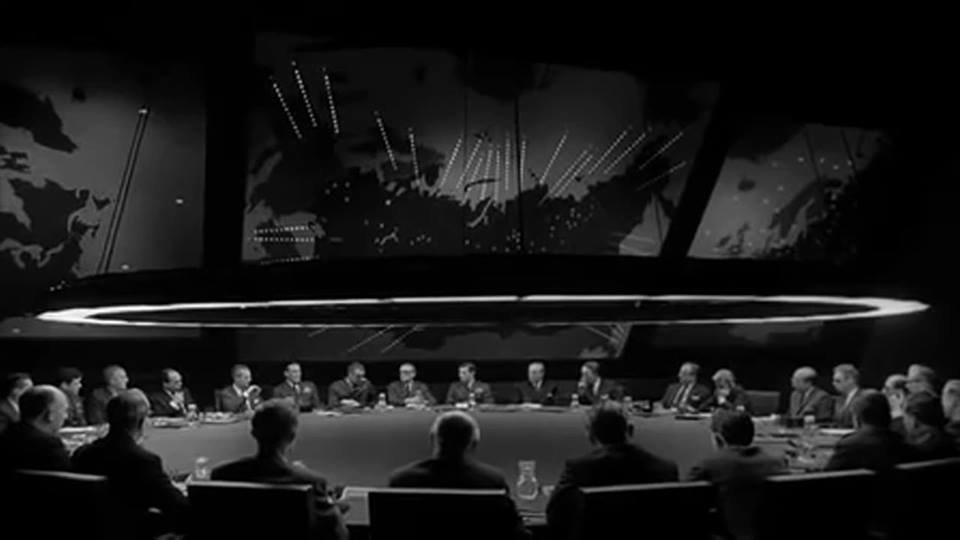-
Posts
1,097 -
Joined
-
Last visited
-
Days Won
1
Content Type
Profiles
Forums
Events
Everything posted by JamesHackerMP
-
Interesting question. There are actually two books I've read in which the United States does precisely that. Not because I have a hard-on for conquest of neighboring nations, but I just happened to have read them. First, Night Probe by Clive Cussler; one of his "Dirk Pitt" adventures. It's 1982 and there's a global petroleum/energy crisis, and a KGB-backed secession movement in Quebec; meanwhile, the USA gets what little oil it has left from Canada. To complicate matters, a researcher going through Woodrow Wilson's personal papers accidentally comes across evidence of a "North American Treaty" that never went into effect because the only two signed copies of the treaty were destroyed. Therefore, no one knew that, in 1914, for the sum of one billion dollars, the US bought the Dominion of Canada. Yikes. (I didn't think that was legally possible, once Canada was confederated, didn't it become a legally sovereign entity? Even before the Balfour Declaration and Statute of Westminster, Canada was still given representation in the League of Nations, in fact.) I love his Dirk Pitt books, they're neat, but I think the premise of Night Probe wasn't too solid, for this reason. https://www.amazon.com/Night-Probe-Dirk-Pitt-Adventure/dp/0553394924/ref=sr_1_1?ie=UTF8&qid=1482309143&sr=8-1&keywords=night+probe Harry Turtledove, who writes a lot of such "alternate history" fiction, wrote a 3-book series on World War One. However, the South had won the American Civil War in 1862. (oops.) Predictably, not long after the Archduke Franz Ferdinand is assassinated, "over there" becomes "over here", as Theodore Roosevelt's USA is aligned with the central powers and Woodrow Wilson's CSA with the Triple Entente. (As Canada is a Dominion state of the British Empire, it becomes a battleground.) https://www.amazon.com/American-Front-Great-War-Book/dp/0345405609/ref=sr_1_1?ie=UTF8&qid=1482309325&sr=8-1&keywords=great+war+american+front Good reads, I thought, more so the first one, even if the premise wasn't legally-sound.
-
The US has effectively "absorbed" the UK's pre-Cold War geopolitical strategy. Under the British Empire, they were worried about the Russians entering the Med, and threatening the "life line" to India, so they kept Constantinople "friendly". The US, when it became a global power, simply continued Britain's strategy of keeping Turkey friendly. I don't see why you're so insistent (in other threads as well as this one) that the US wants to invade Turkey, or is somehow hostile to Turkey.
-
If the SC ruled such a law unconstitutional, the states might ignore it on the grounds that the constitution specifically grants the authority/power to regulate the election of electors to the state legislatures alone. But of course the ultimate authority to count (and by extension, to disqualify) a particular vote is Congress.
-
"Afraid of democracy". Wrong. Yes, they were, but that was already taken care of. Article I, Sec 2., which describes the House of Representatives (the only part of the government directly-elected at the time) says that, if you're eligible to vote in an election for the lower house of your state legislature, you're likewise eligible to vote in an election for your congressman (member of the House of Reps.) Since every state levied property requirements to vote in state elections (which varied from state to state) the common man was already excluded and the possibilities of "democracy" and "tyranny of the majority" were already precluded.
-
One of the purposes of the EC was that they didn't want Congress electing the President. In the "rough draft" of the constitution of 1787 ("Report of the Committee of Detail" of August 7, 1787, a month or so before they adjourned and signed it), the President was elected by Congress. This gave rise to certain problems. The president needs a degree of independence from the legislature in a presidential system in order to do his job. If Congress elected him, congressmen would have to "prostitute their votes" as Hamilton says in No. 68, to presidential candidates. To keep him independent enough, therefore, he couldn't be re-elected. The delegates at the convention wanted a re-electable president with a shorter term so that, even though he should serve for a while, he would therefore have regular re-assessments of his capability and performance (e.g., elections). The rough draft gave him a seven year term, not re-eligible. So like any good assembly, they consigned the problem to committee and moved onto other things, until the Committee of Unfinished Parts made its report a while later, which included the EC scheme. In 1789, there was no technological or logistical possibility of a direct, national popular vote.
-
No you wouldn't see a civil war. Whatever Canadians would like to believe to the contrary, your neighbor to the south has a stable political system. Call it dysfunctional, call it arcane, call it whatever you'd like to call it; you cannot call it unstable. (like "civil war" unstable.) But there would be a political shitstorm.
-
Granted, in 2000, no electors defected, nor in 1888; when the loser of the popular vote won the most electors. Judging by that, you'd be correct to assume it's 0%. This time COULD be a little different. We now have evidence of Russian influence in the election, combined with the fact that the popular vote for Clinton was 2.1%---or 2,864,974 votes---ahead of Donald Trump. (In 2000, the lead was 0.7% ahead, or 543,895 votes.) If I were a bookie, I'd give it a 5% chance (whatever that is in mathematical "odds").
-
As most of you are no doubt aware, the United States does not directly elect its president; 538 presidential electors do. The electors are normally bound by their pledges, but not all states levy penalties for, or debar the electors from, voting outside one's pledge. One TX elector had already announced he's not voting for Trump but a "moderate republican". A Democratic elector from Washington (state of, not the federal capital) announced she too would vote for a moderate Republican instead of Hillary Clinton. (The House of Representatives elects the president from the top 3 returns in the electoral college, should the latter deadlock--not have 270 votes for one of the candidates--so she's actually wise to do that when you think about it, since the House is in Republican hands and they'd never pick Hillary, but might pick a different Republican...who knows?) We shall see. By the end of the day, Trump's now-realized presidential ambitions could be unrealized. It would require 36 Trump electors (from those states where they could do it and get away with it) to defect and vote for someone else. It's a pretty slim chance that would happen. But even if a handful of them decided to defect, it would be not only unprecedented, but it would draw a lot of attention to the fact that Americans are pretty uneasy about the Russian influence in our election. (It might even be remembered long enough to start impeachment charges, should the scandal get a little deeper....but that too is probably a long shot.) Then again, stranger things have happened in American politics before.
-

Revolution No. 9
JamesHackerMP replied to JamesHackerMP's topic in Federal Politics in the United States
And Graham, money has always been a part of politics, and not just in the United States. -

Revolution No. 9
JamesHackerMP replied to JamesHackerMP's topic in Federal Politics in the United States
Who has membership without background checks? -

Revolution No. 9
JamesHackerMP replied to JamesHackerMP's topic in Federal Politics in the United States
Who has membership without background checks? -

Revolution No. 9
JamesHackerMP replied to JamesHackerMP's topic in Federal Politics in the United States
OK...I don't see the administrators of public libraries going around driving a Lexus, but all right. -

Revolution No. 9
JamesHackerMP replied to JamesHackerMP's topic in Federal Politics in the United States
In Rome, they gave more and more power to executive magistrates (particular bringing back the institution of the dictatorship under Sulla and Caesar) as time went on. -

Revolution No. 9
JamesHackerMP replied to JamesHackerMP's topic in Federal Politics in the United States
Of course. But I don't agree with the military's "trough". You say that until you've been a solider/sailor/airman/marine fighting for the United States.

